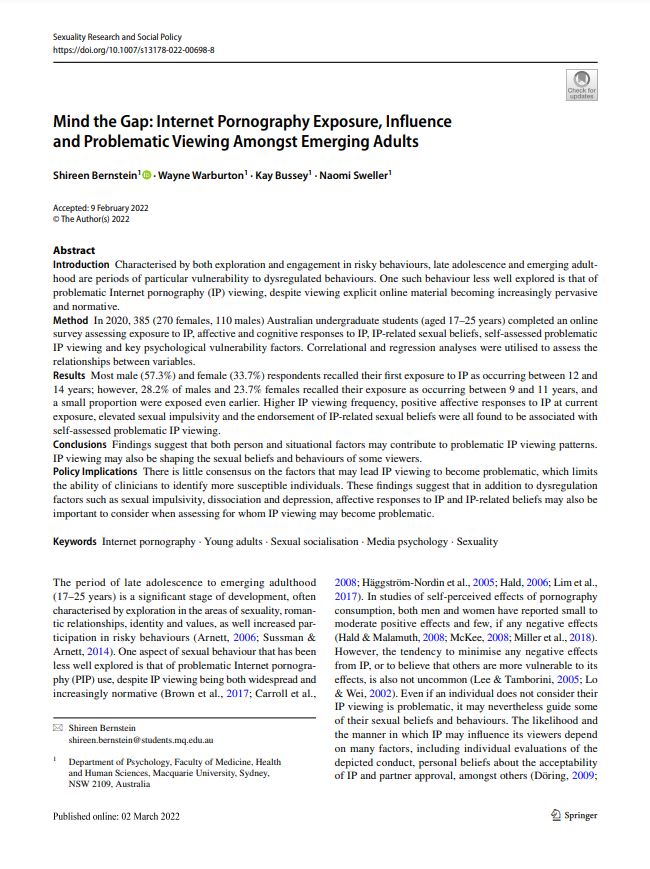Shaping Sexual Behaviors & Sexual Scripts
Mind the Gap
 Full Article Title: Mind the Gap: Internet Pornography Exposure, Influence and Problematic Viewing Amongst Emerging Adults.
Full Article Title: Mind the Gap: Internet Pornography Exposure, Influence and Problematic Viewing Amongst Emerging Adults.
Open Access: Yes
Abstract
Introduction. Characterised by both exploration and engagement in risky behaviours, late adolescence and emerging adulthood are periods of particular vulnerability to dysregulated behaviours. One such behaviour less well explored is that of problematic Internet pornography (IP) viewing, despite viewing explicit online material becoming increasingly pervasive and normative.
Method. In 2020, 385 (270 females, 110 males) Australian undergraduate students (aged 17–25 years) completed an online survey assessing exposure to IP, affective and cognitive responses to IP, IP-related sexual beliefs, self-assessed problematic IP viewing and key psychological vulnerability factors. Correlational and regression analyses were utilised to assess the relationships between variables.
Results. Most male (57.3%) and female (33.7%) respondents recalled their first exposure to IP as occurring between 12 and 14 years; however, 28.2% of males and 23.7% females recalled their exposure as occurring between 9 and 11 years, and a small proportion were exposed even earlier. Higher IP viewing frequency, positive affective responses to IP at current exposure, elevated sexual impulsivity and the endorsement of IP-related sexual beliefs were all found to be associated with self-assessed problematic IP viewing.
Conclusions. Findings suggest that both person and situational factors may contribute to problematic IP viewing patterns. IP viewing may also be shaping the sexual beliefs and behaviours of some viewers.
Policy Implications. There is little consensus on the factors that may lead IP viewing to become problematic, which limits the ability of clinicians to identify more susceptible individuals. These findings suggest that in addition to dysregulation factors such as sexual impulsivity, dissociation and depression, affective responses to IP and IP-related beliefs may also be important to consider when assessing for whom IP viewing may become problematic.
Relevance
In this study of undergraduate students, 1 in 6 male participants assessed themselves to be “addicted” to internet pornography (e.g., “experiencing interpersonal and professional consequences…including delaying priorities or avoiding socialising in order to view” internet pornography). The self-assessment of “problematic” internet pornography viewing was “positively associated” with sexual impulsivity, depression, dissociative tendencies (“increasingly detached from both their own feelings and reality” while viewing online pornography), and holding pornography-related sexual beliefs. The latter includes “a narrative of males as sexually dominant and females as submissive participants, often manipulated or coerced into sexual activity.”
Citation
Bernstein, S., Warburton, W., Bussey, K., & Sweller, N. (2022). Mind the Gap: Internet Pornography Exposure, Influence and Problematic Viewing Amongst Emerging Adults. Sexuality Research and Social Policy, 2 March 2022. https://doi.org/10.1007/s13178-022-00698-8
